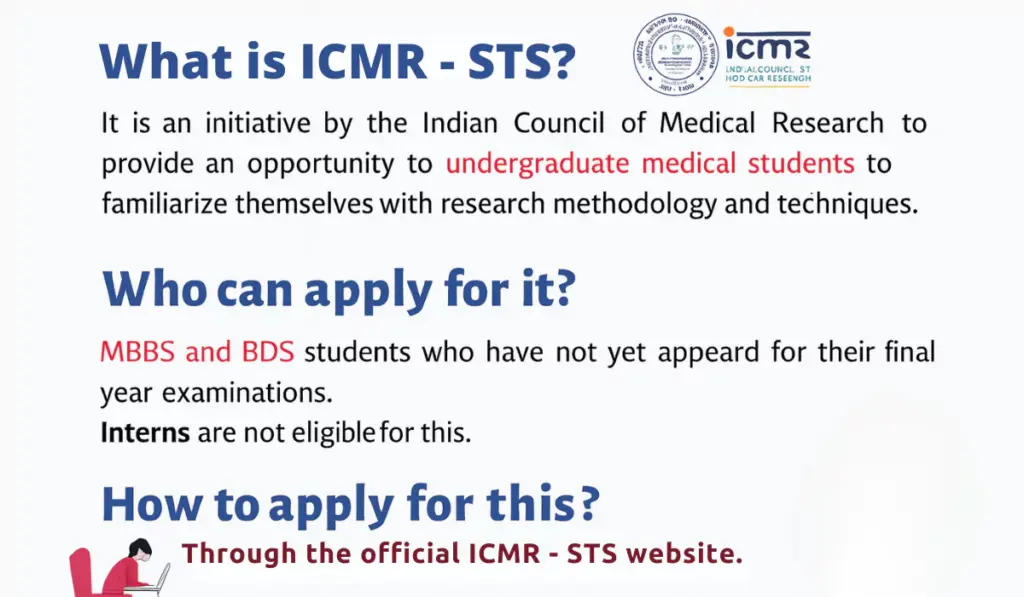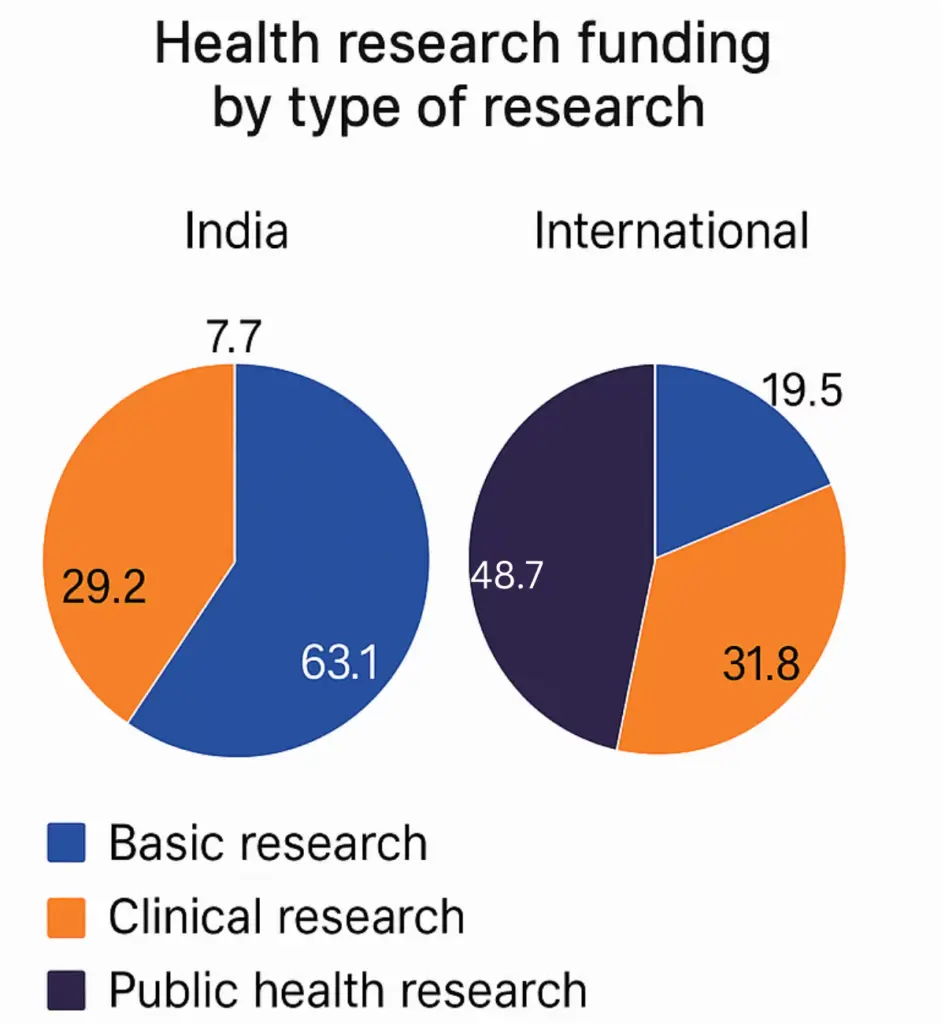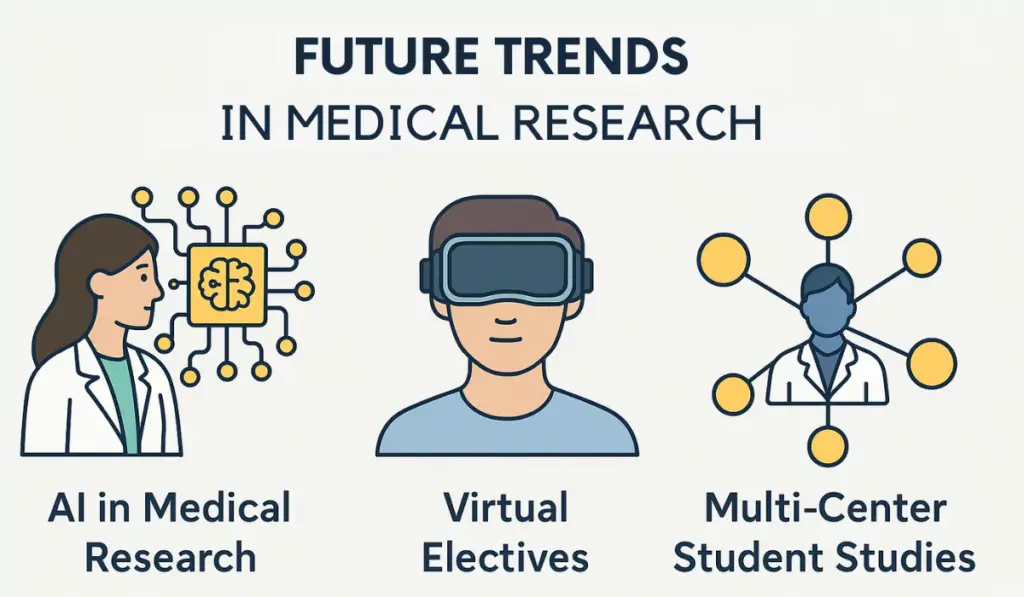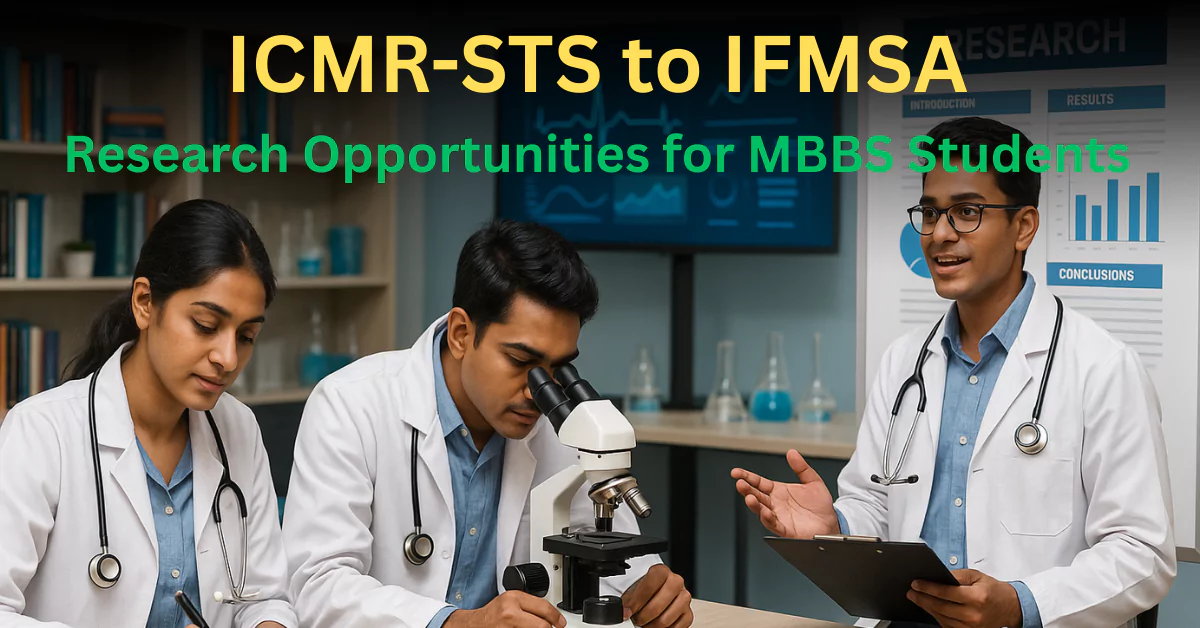Medical education is no longer confined to lectures, exams, and ward rounds. Today, research opportunities for medical students are becoming a defining factor for career growth. Early involvement in research not only sharpens critical thinking but also enhances residency applications, fellowship prospects, and even global exposure.
While countries like the United States, UK, and Australia integrate research into medical curricula, India is still catching up, with initiatives like ICMR-STS fellowships, student-led societies, and NGO-based projects providing a foundation. In this article, we’ll explore the seven major research opportunities for medical students, comparing how they work in India versus international systems, along with insights into funding, infrastructure, publication support, and interdisciplinary learning.
Why Research Matters in Medical Education
- Career Edge: Publications, conference presentations, and fellowships strengthen residency applications in India and abroad.
- Skill Development: Research builds analytical thinking, communication, and problem-solving skills.
- Global Relevance: Medical graduates are expected to critically evaluate evidence and contribute to innovation in healthcare.
Top 7 Research Opportunities for Medical Students
1. ICMR-STS (Short-Term Studentship) India
The Indian Council of Medical Research – STS Program is India’s flagship UG research fellowship. With a stipend of ₹60,000 spread across milestones, it trains students in proposal writing, ethics, and data analysis. However, only ~2,000 students are funded annually, leaving a large gap compared to demand.

Similar Programs Abroad
- NIH Medical Research Scholars Program (USA)
- Wellcome Trust Bursaries (UK)
- Summer Research Scholarships (Australia).
2. Institutional Research & Mentorship
Top Indian colleges like AIIMS, JIPMER, and GS Medical College Mumbai encourage UG students to join faculty-led projects. Initiatives like ASPIRE (Mumbai) and Exponere Mentorship (KEM Hospital) have boosted research participation.
| A.S.P.I.R.E. (Association for Support and Propagation of Innovation, Research and Education) was created with the following goals: 1. Work with different departments of the institute to teach students about research through seminars and workshops, and make ongoing projects easier for students to understand. 2. Encourage more undergraduate students to take part in research by helping them find the right mentor and resources for their ideas or innovations. 3. Provide guidance to students throughout their research journey with the support of experts from the institute. 4. Partner with other institutes and organisations from different fields to promote research and innovation. |
Abroad: U.S. med schools mandate capstone research projects; UK offers joint BSc research degrees; Australian MD programs require research as part of the curriculum.
International Electives & Exchange Programs
Global platforms like IFMSA Research Exchange allow Indian students to intern abroad for 4–8 weeks, while U.S. and UK students often spend electives in developing countries or advanced labs.
| The International Federation of Medical Students’ Associations (IFMSA) Research Exchange, also known as the Standing Committee on Research Exchange (SCORE), offers medical students a chance to participate in research projects abroad. These exchanges aim to enhance research skills, promote cultural understanding, and widen students’ perspectives on global health issues. |
Benefit: Exposure to new healthcare systems, advanced lab facilities, and cross-cultural research collaboration.
4. Summer Internships at Premier Institutes
Indian students can intern at AIIMS, PGIMER, NIMHANS, or even research labs at IISc or ICMR institutes. Though mostly unpaid, these provide high-quality mentorship and access to advanced infrastructure.
International parallel: NIH Summer Internships (USA), HHMI Medical Fellows, Wellcome Trust internships (UK).
Also Read: NEET UG 2025: Loans & Scholarships for Medical Education
5. National & State-Level Conferences
- India: MEDICON, organised by INFORMER, is the country’s largest student research conference. Students also present at specialty society conferences.
- Abroad: ISCOMS (Netherlands), NSRF (Texas, USA), and AMA/ACP student poster competitions.
Conferences improve networking, presentation skills, and publication chances.
6. Research with NGOs & Public Health Bodies
Students can work with SEARCH Gadchiroli, JAN Swasthya Sahyog, or assist in government drives like vaccination surveys.
International opportunities: WHO internships, CDC Epidemiology Elective (USA), Partners in Health, and UNICEF projects.
These experiences give students exposure to community health research and real-world impact.
7. Student Research Societies & Online Platforms
Student-led groups like ASPIRE (Mumbai) and INFORMER chapters foster peer mentoring, workshops, and project databases. Online platforms like IJMS (International Journal of Medical Students), Cochrane Crowd, and hackathons provide collaboration beyond borders.
ASPIRE is a student-led initiative established at Seth G. S. Medical College and King Edward Memorial Hospital, Mumbai, in 2019, to promote and facilitate medical research among undergraduate students through peer mentorship and opportunities.

Research Opportunities for Medical Students: India vs Abroad
| Aspect | India (MBBS) | USA (MD) | UK (MBBS/MBChB) | Australia (MD) |
|---|---|---|---|---|
| Curriculum Integration | Mostly extracurricular | Mandatory research project, MD-PhD tracks | Intercalated BSc for ~30% | Research capstone in MD |
| Funding | ICMR-STS (₹60k, 2000 students/year) | NIH, HHMI, school stipends | Wellcome bursaries, limited | Uni-funded scholarships |
| Conference Support | MEDICON, limited travel funds | Travel grants common | Prizes, bursaries exist | University symposia |
| Publication Output | Low, growing slowly | High, residency-driven | Moderate, often via BSc | Moderate, thesis-based |
| Interdisciplinary Links | Emerging | Strong (MD-MPH, MD-MS) | Growing | Encouraged via MD projects |
Global Trends in Medical Student Research
- Research in Curriculum: Many countries (like Canada) have made research a compulsory part of medical training. India may soon require MBBS students to complete a project or publication before graduation.
- More Funding & Support: Governments and institutes are expanding fellowships and scholarships (e.g., ICMR-STS stipend now ₹60k). Similar global programs may grow to support students.
- Technology & Interdisciplinary Work: Students are engaging in AI, data science, genomics, and digital health research. Hackathons and collaborations with tech institutes are becoming common.
- Global Collaboration: Students across countries are joining forces on international studies, supported by organisations like IFMSA and online platforms.
- Structured Mentorship: Medical colleges are likely to assign research mentors to students, just like clinical advisors, to build a research culture. Faculty training for guiding student research is also expanding.
- More Student Publications: With increasing participation, student-led research journals and college-based journals may grow, adding to global scientific knowledge.
- Career Impact: Research experience will matter more for residencies and future careers. India may even see MD-PhD or MBBS-PhD programs emerging.

Key Tips for Students
- Start Early: Join projects from 1st/2nd year; even small roles help.
- Use Programs: Apply for ICMR-STS or summer scholarships for guidance and funding.
- Find Mentors: Connect with faculty and senior students; network at conferences.
- Balance with Studies: Align research with your subjects and use vacations wisely.
- Focus on Skills: Learn critical thinking, analysis, writing – not just publications.
- Showcase Work: Present in seminars, write for journals, keep records for your CV.
- Collaborate & Stay Ethical: Work in teams, give credit, follow ethics strictly.
- Stay Curious: Read journals, ask questions, and explore new areas like digital health, climate change, or medical innovation.
The future is promising – medical student research is shifting from optional to essential, opening new opportunities in science, innovation, and careers.
Read Also: India’s Medical Education Revolution: NMC Reforms, CBME, NEXT & More
Challenges in India
- Research is often treated as extracurricular instead of curriculum-integrated.
- Limited funding compared to massive MBBS intake (~1.17 lakh seats/year).
- Low publication culture among undergraduates.
Building a Global Research Mindset
For medical students, research is no longer optional – it is the gateway to academic medicine, global exposure, and innovative thinking. In India, initiatives like ICMR-STS, MEDICON, and NGO collaborations are paving the way. Internationally, research is deeply embedded in the medical curriculum, offering structured funding and mentorship.
Whether you are an MBBS student in India or a medical trainee abroad, grabbing research opportunities early can define your career path. Present at conferences, apply for fellowships, join student societies, and collaborate globally – because the future of medicine belongs to doctors who are also researchers, innovators, and problem-solvers.

